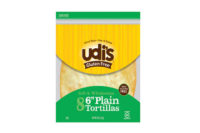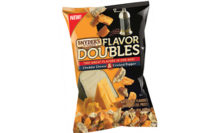Whether they refer to it as a tortilla or a wrap, consumers are calling on this versatile, unleavened bread to help them create quick, nutritious meals and snacks. Tortilla manufacturers are introducing healthier formulations, ‘snack sizes’ and new flavors to meet consumers’ dietary and culinary needs.
Most people refer to a thin, round, unleavened bread made from cornmeal or flour as a tortilla; others call it a wrap. Manuel Berber, president of Mi Rancho, San Leandro, Calif., says it’s a “great carrier.”
“It’s very universal to use the product to carry leftovers from the night before or for breakfast burritos or specialty items,” he says, adding that growing consumer interest in Asian, Italian, Indian and Afghan foods, as well as the popularity of Hispanic foods, is driving tortilla sales.
And when it comes to the product, there’s essentially no difference between a tortilla and a wrap, Berber says, adding that flavored tortillas, such as spinach, tomato and basil and chipotle, enable restaurants to dress up plates, create innovative presentations and charge a premium for items made with them.
While most consumers primarily use tortillas as a carrier for other foods, some people are now also buying them for what they do and don’t contain. For instance, many tortilla manufacturers are now touting products that are low-calorie, low-carb, low-sodium, organic, ancient grain, “all-natural” and gluten-free.
“Corn tortillas are gluten-free, which is a huge factor,” says Berber. “They are developing gluten-free flour tortillas, too, but they don’t seem to be holding up as well. Further R&D will lead to the development of these products. There has definitely been huge growth in the [gluten-free] segment in the last 10 to 15 years.”
Mi Rancho makes both flour and corn tortillas, the latter of which are made from masa made from fresh corn that’s steeped, cooked and ground. Its all-natural line comprises artisan flour and corn tortillas, ancient grain tortillas (flax, quinoa, amaranth, buckwheat and brown rice), organic corn tortillas and organic taco sliders. The company’s hand-crafted Mama’s tortillas are made using enriched flour. The company sells its products to foodservice and retail customers west of the Rocky Mountains.
Homestyle reminder
“We’re making a lot of organic products now,” Berber notes. “We’ve been doing that for 25-30 years in foodservice. We’re taking what we do in the foodservice arena and bringing that into retail grocery, so it’s new to our customer base, and potential customer base in that segment.”
Many of the company’s foodservice products end up in the retail market, too, in the form of ready-to-eat wraps, sold in sandwich shops, grocery delis and quick-service restaurants (QSRs), says Fernando Alvear, vice president of sales and marketing. “We’re not only helping our customers expand their menu offerings, we’re also working with them to add products that are organic, all-natural, low-carb and more,” he adds.
As with many other foods, consumers also want tortillas that remind them of the homestyle meals their moms or grandmothers made, says Alexa LaVere, sales and marketing supervisor. “It has to have the toast marks as well as a true, authentic flavor and texture,” she explains. “One of our flagship products—the Mama’s Handcrafted Fajita Flour—is 6-in. thick, with toast marks and a nice flavor. We had such a great response to it that we did a complete line extension based on it in mid-October.”
While Mi Rancho’s products address a variety of consumer trends, the company hasn’t lost sight of what people want most from food: Good taste. “So many people are producing products just to hit a certain calorie [level] or whatever,” Berber explains. “We’re trying to get the taste profile right as well, even though the product may have more calories. We’re trying to create a very good-tasting product.”
To encourage customers to check out its products, Mi Rancho uses packaging that doesn’t conceal the tortillas, and clearly lists their ingredients. “We’re trying to show the product inside and, at the same time, show its attributes as well,” says Berber, adding that the company updates the information in its Nutritional Facts panel as needed. “We follow all of the guidelines completely. As people become more aware of food safety and the ingredients being put into products, they want more information.”
Gluten-free options
A variety of trends—low-carb, gluten-free, paleo and reduced-gluten—are also driving demand for Udi’s Gluten Free Tortillas, says Denise Sirovatka, vice president of marketing, at Udi’s Healthy Foods LLC, Denver. The company launched its 6-in. and 9-in. gluten-free plain tortillas in 2013.
“Manufacturers have been resistant to innovate in this category, because corn tortillas have been the long-standing gluten-free substitute,” she says. “However, Udi’s continues to test the boundaries and deliver on the high-taste expectations of gluten-free consumers. We are the first national brand to offer tortillas that mimic the taste and texture of flour tortillas.”
Udi’s customer base extends beyond people with celiac disease, gluten sensitivities and other dietary constraints. Individuals living a gluten-free or low-gluten lifestyle to feel better are also seeking out its products.
Like Mi Rancho’s Berber, Sirovatka notes that tortillas are a versatile product that can be used for many meals—burritos, tacos, wraps and more—and consumers use the company’s products to satisfy a variety of gluten-free cravings and social occasions.
“Gluten-free consumers love to cook and are savvy in the kitchen,” she says. “Part of their gluten-free journey includes being creative and inventive with the Udi’s products they love. Consumers use Udi’s tortillas to make wraps, pizzas, crepes and more.” The company offers consumers more ways to use its products on its website (www.udisglutenfree.com) and social media channels.
Asked what the future holds for Udi’s, Sirovatka responds, “As Udi’s sets a new standard for gluten-free flour tortillas, we see long-term growth potential in both retail and foodservice markets. As we see Udi’s Gluten Free Tortillas increase in popularity and sales, we can start looking to increase variety and availability of more healthful options like multigrain or new flavors like red pepper, spinach and more.”
Healthier options
Chicago-based Azteca Foods Inc., meanwhile, is relaunching its entire Azteca product line this summer. “Our new product platform perfectly aligns with consumers’ desire for healthier options,” says Julie Nargang, vice president marketing/innovation.
The 12 stock-keeping unit (SKU) platform is anchored by four flour tortilla options made with no preservatives or artificial colors or flavors. “We are able to achieve this because [our products] are always refrigerated—from our ovens to the retail shelf,” Nargang explains.
The other options are two sizes of flour tortillas with added calcium and vitamin D; a tortilla made with Ultragrain flour; and options in organic, gluten-free, whole-grain and low-carb.
Keeping in step with snack trends, Azteca Foods also will begin shipping a new snack-size tortilla this month. “This is a 4-in. tortilla perfect for adult and kid snacking,” says Nargang. “It allows the ‘one-hand meal,’ a necessity for on-the-go snacking. In addition, it is also the perfect size for appetizers and party fare.”
Complementing Azteca Foods’ new product launch this month is a new packaging design. “We’ve updated our packaging to have a more authentic flair, incorporating key communication pieces and graphic elements the consumer was looking for,” Nargang explains. “[It also] clearly promotes our ‘healthier-for-you’ position.”
Vibrant, full-color food photos with corresponding recipes on the back of each package provide quick and easy meal solutions and inspiration for shoppers—typically busy, working moms. “Their families are number-one,” says Nargang. “Moms use cooking dinner at home as a way to connect with their families and be creative. They seek out healthier options.” A quick response (QR) code links consumers to additional creative recipe and snacking ideas.
Ready-to-eat options
When life becomes so hectic that even easy-to-follow recipes and versatile meal helpers like tortillas make preparing a home-cooked meal impossible, busy consumers often head for their grocer’s frozen foods department. Those craving ready-to-eat Mexican fare will find several new El Monterey items from Ruiz Food Products Inc., which manufactures the tortillas it uses to make its products.
One of the Dinuba, Calif., company’s newest additions to its frozen Mexican lineup is El Monterey Shell Shockers Taquitos in three flavors: El Monterey Shell Shockers Chicken Taquitos with Jalapeno, El Monterey Shell Shockers Chicken Taquitos with Nacho Cheese and El Monterey Shell Shockers Fiery Hot Taquitos. “What’s exciting about this platform is that it takes a traditional Mexican item and brings excitement by adding a bold flavor on the outside,” says Rachel Cullen, president and CEO.
The El Monterey Single Serve Supreme Burritos line, another recent introduction, features Shredded Steak and Cheese Burritos, Chicken and Monterey Jack Cheese Burritos, Chicken and Monterey Jack Cheese Chimichangas and Shredded Steak and Cheese Chimichangas.
Consumers can get a jump on their day without skipping breakfast with El Monterey Breakfast Burritos. Flavors are Egg, Sausage, Cheese and Potato; Egg and Bacon; Egg, Sausage and Cheese; and Jalapeno, Egg and Cheese.
“We believe innovation is important,” says Cullen. “As a result, we are always experimenting with new product ideas, while staying abreast of emerging consumer taste preferences. As a frozen Mexican food manufacturer that makes its own freshly baked tortillas, our commitment to innovation also expands the use of tortillas to different and even more exciting offerings.”
Challenges and opportunities
According to data from Chicago-based IRI, consumers spent approximately $2.45 billion on hard and soft tortillas and taco kits for the 52-week period ending April 20. Despite strong sales for these products, tortilla manufacturers, like other bakers, will likely be impacted by a variety of factors, including more stringent food-safety regulations and audits, higher transportation costs and higher ingredient costs.
“As a gluten-free company, ingredient prices are always a factor, as gluten-free ingredients tend to be more costly than conventional ingredients,” says Sirovatka.
Mi Rancho’s Berber concurs: “What affects us the most is the commodity cost. If the commodities go through the roof, it’s more challenging for us.” Those challenges can include finding good ingredient sources, being more careful with ingredients and being competitive in the marketplace.
Regardless of these challenges, Berber says there are many opportunities for growth for the tortilla industry, as the demand grows for tortillas grow due to their many uses.
Sirovatka says Udi’s sees “long-term growth potential in both retail and foodservice markets, an increase in tortilla variety and availability of more healthful options.”
“Tortillas will continue to gain in popularity due to their versatility and perceived ‘healthier’ position versus some other bread-type
options,” Nargang contends. “They are consumed in both eating and snacking occasions, [and] are the perfect carrier for most any ingredient. They have become a staple in family menu planning, as they offer the ultimate versatility for both Hispanic and nonHispanic meals.”










